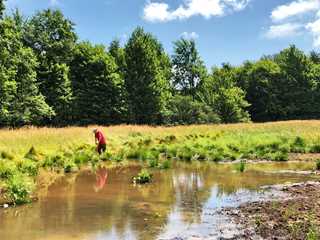Mitigating lost Atlantic Flyway habitat
Ducks Unlimited's mitigation program helps developers replace wetlands
Ducks Unlimited's mitigation program helps developers replace wetlands
Legal protections for wetlands, notably through the Clean Water Act, are the hallmark of wetland conservation efforts in the United States.
However, development needs and societal growth often lead to unavoidable impacts to marshes, streams and lakes. In these situations, permitting laws require developers and companies to mitigate, or replace, wetlands with more acreage than what was impacted.
Ducks Unlimited has mitigation programs in New York, North Dakota, South Dakota, Tennessee, Vermont and Mississippi. Through these programs, Ducks Unlimited protects or restores wetlands and sells credits to developers who need to replace wetlands because of construction projects.
In the Atlantic Flyway, DU's mitigation program is most active in central and western New York and covers priority areas in Vermont, including the Lake Champlain Basin. Ducks Unlimited protects and restores important areas while generating some profit that can be used to cover organizational costs and boost long-term land protection funds.

"In the Northeast, 1,655 acres have been protected through mitigation in the last three years alone," said Patrick Raney, manager of conservation services - mitigation for DU's Great Lakes/Atlantic Region.
Typical projects protect about 165 acres, meaning the program is contributing to watershed-scale conservation efforts. Northern shovelers, wood ducks, mallards and mergansers are frequent visitors to these sites, as are moose, bear, bobcats, fishers, porcupines and numerous songbirds.
DU's third mitigation construction in the last year is underway and will finish several projects in New York and Vermont in the next few years.
For details, visit www.ducks.org/mitigation
Ducks Unlimited uses cookies to enhance your browsing experience, optimize site functionality, analyze traffic, and deliver personalized advertising through third parties. By continuing to use this site, you agree to our use of cookies. View Privacy Policy